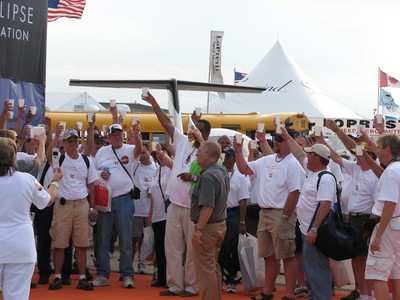Hearing Ends With Little Sign Of Resolution
 ANN REALTIME UPDATE
09.17.08 1700 EDT: Did the FAA rush the certification of
the Eclipse 500? Calvin Scovel, DOT Inspector General, believes
so... telling the House Transportation and Infrastructure Committee
on Wednesday the plane was certified by FAA officials despite known
issues with the plane's flight control software, avionics functions
and displays, wing flaps, and stall warning system.
ANN REALTIME UPDATE
09.17.08 1700 EDT: Did the FAA rush the certification of
the Eclipse 500? Calvin Scovel, DOT Inspector General, believes
so... telling the House Transportation and Infrastructure Committee
on Wednesday the plane was certified by FAA officials despite known
issues with the plane's flight control software, avionics functions
and displays, wing flaps, and stall warning system.
In some of those cases, the FAA issued an Alternative Method of
Compliance (AMOC), which is a fairly common practice. To solve the
problem of the Eclipse 500's stall warning horn sounding while on
final approach to land, for example, the FAA signed off on
Eclipse's raising of book approach speeds -- taking the plane above
the speed threshold where the horn sounded, but still keeping it
within the safe range for touchdown.
To address other concerns, Eclipse submitted what essentially
were "IOUs" to the FAA, promising compliance at a later date AFTER
the certification was issued. Scovel slammed that practice, saying
the FAA essentially allowed Eclipse to skate by with an aircraft
design that didn't meet agency standards.
When questioned by Representative Robin Hayes (R-NC), Scovel
conceded his office had found "no evidence" to suggest the Eclipse
500 is an unsafe aircraft. Scovel added, however, that given what
the FAA knew of the plane's shortcomings -- brought to the FAA's
attention by several of its own inspectors, who refused to sign off
on the plan to give Eclipse a TC -- "a reasonable decision would
have been to defer the granting of the type certificate."
As ANN reported, the FAA granted Eclipse
Aviation its final type-certificate on September 30, 2006, two
months after then-Administrator Marion Blakey issued a much-touted
"provisional" certification at AirVenture 2006 (below).

The final certification date is noteworthy in that it was a
Saturday, and the end of the FAA's 2006 fiscal year. The date was
also Eclipse's own self-imposed deadline to achieve
certification.
After Scovel's testimony and subsequent questioning by the
committee, lawmakers heard from Maryetta Broyles, an engineer
involved with the Eclipse 500's type-certification. She told
lawmakers of what she termed a curious, and ominous, similarity
between what she said were her marching orders from the FAA, and
what she later heard from Eclipse personnel:
"He stated that we should do a
high level or overview of the system because the company had
already been audited numerous times. It was then stated "in other
words we need to only go an inch-deep when evaluating the quality
system." I was shocked when I heard this statement. I had never
been told to go only an inch-deep when conducting an
audit...
"I am a very thorough evaluator.
During my evaluation I found issues with the Horizontal Stabilizer
Assembly... These discrepancies should have been corrected before
the Eclipse inspector signed it off. I requested the drawings to
evaluate the condition further. When looking at drawings, one
drawing led to another and so on. My escort said to me "Maryetta
you are going more than an inch-deep. You are going too deep." I
was surprised that my escort had heard that statement. I do not
know how he received the same information that was briefed only to
the FAA. I acknowledged his remark."
FAA managers David Downey and Ford Lauer submitted in
writing to the committee their concerns about Eclipse's
certification to the FAA.
Downey told the committee his team felt "undermined and
threatened" when they raised their concerns to officials in
Washington; Lauer added his team found "improperly installed
fasteners, misrouted electrical wiring, unsatisfactory safety wire,
wrong fasteners being used, inadequate clearances between moving
parts, etc." on ostensibly production-quality aircraft.
"Eclipse management would not hesitate to complain to FAA
management when they perceived FAA inspectors were interfering with
Eclipse's ability to deliver airplanes," Lauer added.
Representatives from the FAA also had the chance to make their
case -- led by Nick Sabatini, Associate Administrator for Aviation
Safety. In his prepared testimony, Sabatini pointedly said "FAA
professionals would never and, in this case, did not, certify an
aircraft that they knew to be unsafe or one that did not meet
standards. I am unaware of any FAA safety professional who would
choose to put the safety of the flying public at risk by certifying
an unsafe product for introduction to the NAS [National Airspace
System.]"

When questioned directly, Sabatini adopted an equally defensive
tone... attributing most of the employees' concerns about the
certification to inexperience, saying the Fort Worth FSDO had no
experience with certifying a "high profile, complex project." He
also defended those instances when FAA headquarters got involved,
and overruled those workers -- calling such steps "entirely
appropriate."
John Hickey, the FAA official in charge of certification,
conceded Eclipse took longer than average to achieve certification
-- over five years, compared with the typical three-year period for
a plane the size of the Eclipse 500. Such timeframes are not
uncommon, Oberstar pointed out, noting Cirrus Design took a similar
amount of time to certify its SR20.

In a relatively short statement to conclude the session, Eclipse
president and general manager Peg Billson (above) reasserted the
Eclipse 500 is a safe aircraft... adding some of the testimony took
her by surprise, noting that the DOT's Scovel has yet to speak with
anyone at Eclipse about his concerns. (Curiously, Eclipse
Acting-CEO Roel Pieper -- who was present throughout the hearing --
left shortly before his panel was called on to testify --
Ed.)
The hearing ended Wednesday with no clear indications of what
would be done to address concerns about the Eclipse 500, or the
FAA's certification process. But one thing appears certain: that
the FAA's current "Customer Service Initiative" -- intended to
present a less-confrontational atmosphere between the agency and
companies seeking its authorization -- is likely not long for this
world.
Chairman Oberstar pointedly noted that system may be
addressed -- or even "abolished" -- by future Congressional
action.
Original Report
 1200 EDT: We're just
under two hours in to a hearing before the House Committee on
Transportation and Infrastructure, looking into the FAA's alleged
rush to certify the Eclipse 500 very-light jet... and so far, only
one panel witness out of the 12 scheduled has testified.
1200 EDT: We're just
under two hours in to a hearing before the House Committee on
Transportation and Infrastructure, looking into the FAA's alleged
rush to certify the Eclipse 500 very-light jet... and so far, only
one panel witness out of the 12 scheduled has testified.
By all indications, it's going to be a very long day... for
committee members, for those persons called to testify, and for
Eclipse Aviation. One thing is clear: that committee chairman Jim
Oberstar has serious concerns about how the FAA conducted itself in
regards to certifying the EA500.
Commenting on the FAA's "Customer Service Initiative" -- which
Oberstar believes led to an overly-friendly relationship
between FAA senior officials and Eclipse management -- the
Minnesota congressman said he was not reassured by the FAA's
repeated assertions the agency's safety record speaks for itself,
and shows that the process works.
"I fear that complacency may have set in at the highest levels
of FAA management, reflecting a pendulum swing away from vigorous
enforcement of compliance, toward an industry-favorable cozy
relationship," he said.
Oberstar added that such apparent complacency amounts to a
"graveyard mentality," which doesn't recognize problems until
serious accidents occur. "Safety should not amount to lucky
breaks," Oberstar said in later comments. "The FAA has clearly made
some serious mistakes."
Specifically, Oberstar questioned how a newly-formed company
like Eclipse was able to obtain Organization Designated
Airworthiness Representative (ODAR) approval, which allows the
company to appoint its own representatives to handle areas of
certification compliance.
Calvin Scovel, the Inspector General for the Department of
Transportation, conceded "it would be very difficult" for a new
company like Eclipse to demonstrate the technical expertise
necessary to receive ODAR status. (It's apparently not impossible,
though; in addition to Eclipse, other fairly new planemakers that
have attained ODAR status include Adam Aircraft, Spectrum
Aeronautical, and Cirrus.)
In his testimony before the committee, Scovel also expressed
apparent wonderment as to why Eclipse submitted a non-conforming
aircraft for tests related to single-pilot operations approval, as
was revealed by the FAA's Special Certification Review team. Scovel
was "puzzled" why the company would do that, particularly since the
EA500's success as an owner-flown plane was so vital to the
company's business model.
If Eclipse has a "friend" on the committee, it would be North
Carolina Congressman Robin Hayes... who cautioned the committee in
his opening comments that "we need to really be careful what we're
doing here," maintaining the committee shouldn't lose sight of the
larger picture when it comes to aircraft safety.
Hayes also pointedly asked Scovel the question on the minds of
many in the aviation industry: is the EA500 a safe plane to fly?
"My office has no evidence that it is unsafe," Scovel replied.

The National Air Traffic Controllers Association -- which, in
addition to its primary role in representing controllers, also
represents FAA aircraft certification workers -- filed a grievance
in October 2006, alleging "several outstanding safety/regulatory
issues" raised by several engineers and test pilots involved with
the EA500's certification.
The grievance didn't mention specific issues with the plane, and
was denied by the FAA... which continues to stand by its
certification.
Having been shut down by the FAA, the inspectors took their
concerns directly to the Department of Transportation, and to
Congress... where they found an audience. The inspectors'
complaints prompted Wednesday's hearing.
"What did the FAA slip up on?" Oberstar asked. "There are system
shortcomings we have to assure the FAA fixes in the future."
ANN will continue to monitor the hearing throughout the day.
 ANN's Daily Aero-Linx (04.15.24)
ANN's Daily Aero-Linx (04.15.24) Classic Aero-TV: 'No Other Options' -- The Israeli Air Force's Danny Shapira
Classic Aero-TV: 'No Other Options' -- The Israeli Air Force's Danny Shapira Aero-News: Quote of the Day (04.15.24)
Aero-News: Quote of the Day (04.15.24) Airborne 04.16.24: RV Update, Affordable Flying Expo, Diamond Lil
Airborne 04.16.24: RV Update, Affordable Flying Expo, Diamond Lil ANN's Daily Aero-Term (04.16.24): Chart Supplement US
ANN's Daily Aero-Term (04.16.24): Chart Supplement US








